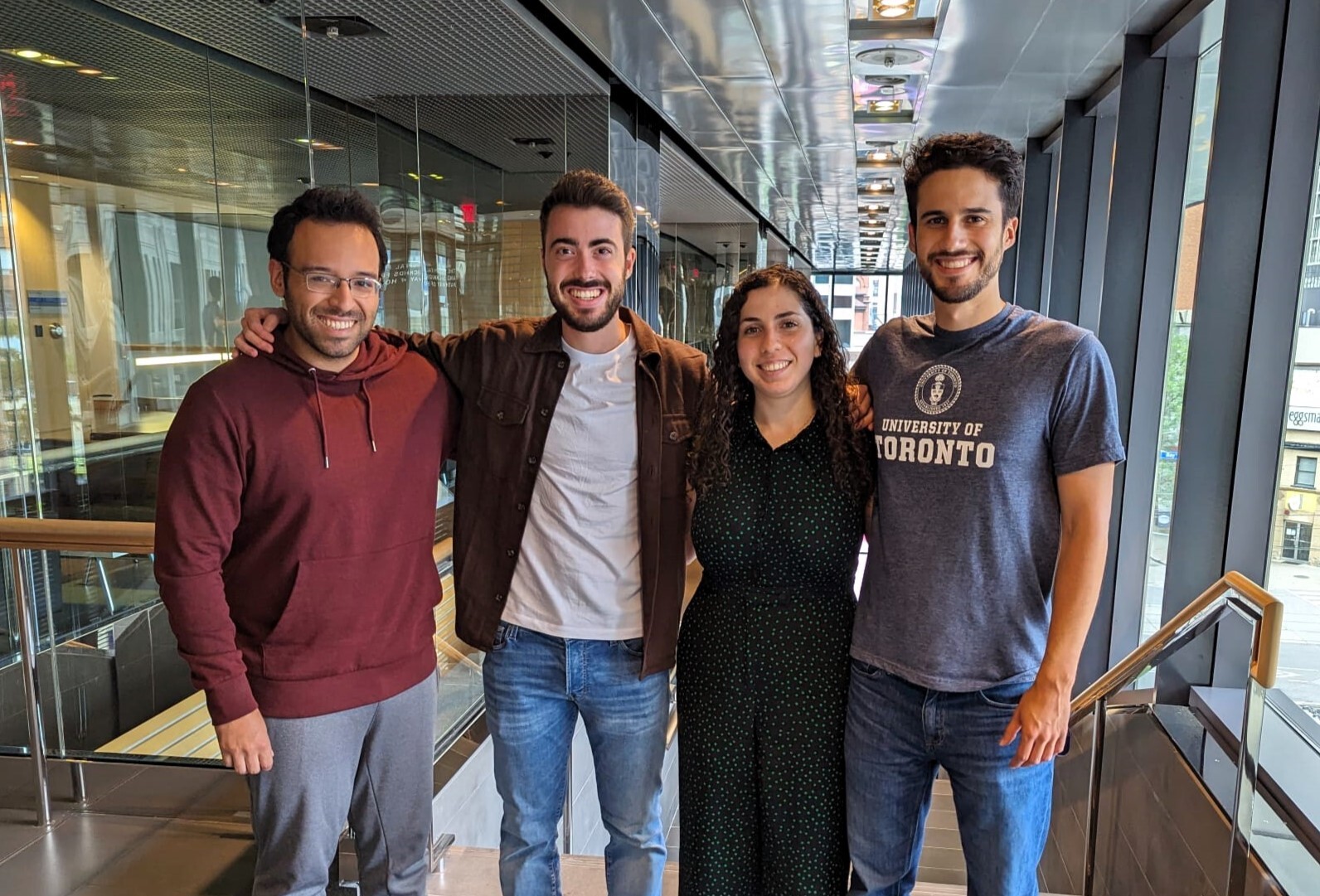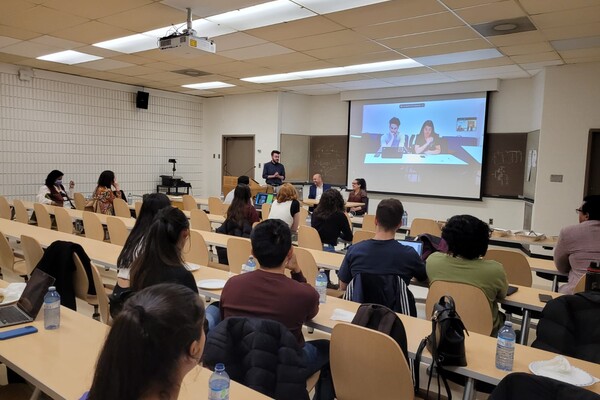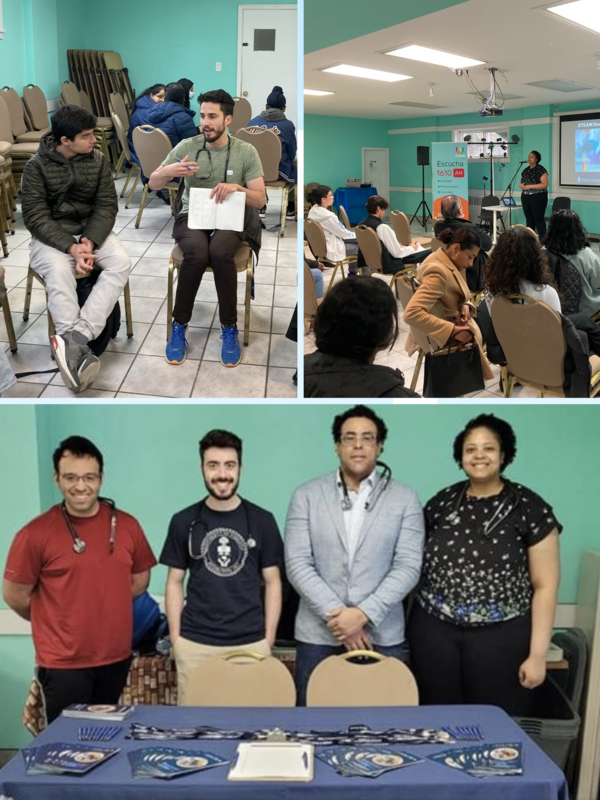
The Hispanic Medical Students Association (HMSA) only formed this spring, but the group has already hosted several events for the medical and Hispanic communities, and has begun to have impact well beyond the Greater Toronto Area.
Leaders of the group, who are students in the MD Program at U of T’s Temerty Faculty of Medicine, include Pablo Gonzalez, Nick Garrido, Eduardo Rojas, and Shenhab Zaig. They shared their thoughts on their work to date with writer Jerusha Retnakanthan.
What motivated you to launch HMSA?
Gonzalez: Even before I was accepted to medical school, I had this dream to start a group that brings together people who are Latin American and those who are interested in how Latin culture and health care intersect. And so, when I got my acceptance from U of T’s medical school, things became real.
I grew up in a church community with many Spanish speakers from all across the Americas, and so I was surprised at just how underrepresented Hispanic and Latin American people are within medicine. I’d never met a physician with Latin American heritage, and I realized the health-care experiences of a community are truly dependent on having practitioners who are able to connect with them culturally.
Rojas: To this day, my parents speak about the one interaction we’ve had with a Latin doctor — who spoke Spanish, but was also warm, approachable and valued how much family is involved in our culture. It was actually Pablo’s mom who approached me at the Stethoscope Ceremony to introduce us, which shows how excited members of the Latin community are to connect with each other!
Zaig: To my knowledge, there was only one other Latin person in my class last year, and when we thought about starting a group she said, “Well, who’s going to come, just me and you?” There are obviously a lot of reasons why Latin communities are underrepresented in our field, but I think one big way to address that is by being able to see ourselves. For example, I am not visibly Latina — my last name is not Rojas or Gonzalez. I think there’s also an important role for female-identified representation in this group. HMSA offers a platform to show that in medicine, we might be small for now, but we are a strong and diverse global community.

What’s a memorable moment from your outreach so far?
Rojas: The first event where we had speakers from the community, on Hispanic health and cultural sensitivity, was really special. My parents came too, and I was talking with them afterwards about Latin identity. It’s not something I outwardly express a lot, but after hearing the speakers I felt genuinely empowered, and that I had found a part of my identity that had been missing.
It also meant a lot to me that my peers went out of their way to come, and that everyone showed so much care for what we had to say.
Zaig: Eduardo did a beautiful interview with a Spanish-speaking local radio station right before the event, and we were just so moved by all the support from the community. They were rooting for us, and I think it was validating for the Latin community to know that there were students at U of T advocating for them.

Gonzalez: Yes, it was amazing to be on CHHA 1610 AM, and we realized after that people across Canada, even in the Eastern United States, are excited about this. As far as I’m aware, there aren’t any other Hispanic or Latin American medical school groups in the country — the four of us are pioneering this initiative. Then we had a student from the University of British Columbia reach out after seeing our HMSA Facebook group, to learn more about us and possibly start something similar. I’m really hoping these initiatives will gain traction, because the need for Latin American representation is everywhere.
Garrido: We also had a couple opportunities to partner with the STEAM Design program and teach clinical skills to high-school students. Besides being an impactful effort to increase representation, seeing the students’ enthusiasm was incredibly rewarding. Being able to directly hear their vast interests and connect with them on a personal level is why I remember it so fondly.
What are some of your goals for the upcoming year?
Gonzalez: We’re partnering with the Organization of Latin American Students at the University of Toronto to organize a health-care symposium for future Latin American health leaders. We’ll be inviting Latin American undergraduates from U of T, Toronto Metropolitan University and York University to join us downtown. There will be multiple panels speaking about their success and challenges, and panelists can advise on pathways for undergraduate students.
Garrido: The availability of role models and formal mentorship for Latin American students interested in pursuing medicine is vital in increasing representation. Personally, I've been the beneficiary of exceptional mentorship up to this point, and I think it is important to pay it forward through HMSA.
Zaig: Last year I co-ran the HIV speaker series, and our last dinner event was with folks from the Toronto People with AIDS Foundation. Looking around the room, many of community members present there were Latino. We were able to have a beautiful conversation about the way Latin culture interacts with HIV and the stigma that’s often present. So, this year we’re hoping to partner with local advocacy organizations for a workshop.
Rojas: In the winter we’ll pick up where we left off with our first event and further discuss culturally sensitive health care for the Latin community. We’ll also add in some education on typical Spanish words that might be helpful when interacting with patients. Then our fourth event is meant to be a celebration of culture through dance, possibly salsa. We hope that many members of Temerty Medicine will be excited to join us!